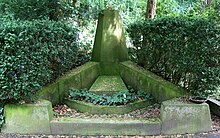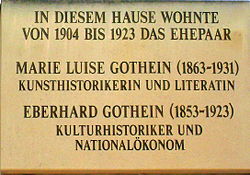Eberhard Gothein
Eberhard Gothein (born October 29, 1853 in Neumarkt , Lower Silesia, † November 13, 1923 in Berlin ) was a German economist , cultural and economic historian .
biography
Eberhard Gothein was a student at the Maria-Magdalenen-Gymnasium in Breslau , where he and Paul Ehrlich passed the matriculation examination in 1872. He then studied at the Universities of Breslau and Heidelberg with a focus on history and art history. In 1877 he was awarded the title of Dr. at the Reichstag in Worms with his dissertation The Common Pfennig. phil. PhD. In 1878 he completed his habilitation at the University of Breslau. As a professor of economics, Gothein taught at the Technical University of Karlsruhe from 1885 , from 1890 at the University of Bonn and from 1904 to 1923 at the University of Heidelberg , where he took over Max Weber's chair for economics. In 1909 he was accepted as a full member of the Heidelberg Academy of Sciences . From 1916 he was a corresponding member of the Bavarian Academy of Sciences .
As rector of the University of Heidelberg in 1914 he registered with great concern the German mobilization and the beginning of the First World War . On an information trip to the Ruhr area, he conferred with the industrialists Klöckner and Stinnes and later with Thyssen .

On January 12, 1919, Gothein was elected to the state constitutional assembly for the German Democratic Party (DDP) . He was able to participate in the development of a state constitution for the Republic of Baden . Together with his former school friend Heinrich Rosin from Wroclaw , who at the time was a professor at the University of Freiburg , he campaigned for adult education . In 1922 Gothein accepted the call of the Foreign Office in Berlin to reform the training of future diplomats.

As the successor to Jacob Burckhardt, Gothein represented the right of cultural history to be independent. Among his writings, the descriptions of the history of the south-west of Germany are of great importance. In 1924 his two-volume writings on the cultural history of the Renaissance, Reformation and Counter-Reformation were published posthumously .
As a political economist, Gothein campaigned for the conversion of theoretical knowledge into practical applications. So he fought for the establishment of the Cologne Commercial College , where he also taught part-time from 1901. In 1905 he was heavily involved in the establishment of the Mannheim Commercial College . The vocational school in the field of commercial education and training in Mannheim bears his name: Eberhard-Gothein-Schule.
Gothein was married to the art historian Marie Luise Gothein . Their sons Percy Gothein and Werner Gothein came from the marriage . Gotheins younger brother Georg Gothein was Reich Minister of the Treasury in the Scheidemann cabinet (1919).
Interdisciplinary position
The Gothein couple corresponded in 2,000 letters for forty years. In 1999 the cultural historian Michael Maurer , University of Jena , found it in the Heidelberg University Library . As part of the two-year research project Adieu History, and yet goodbye , the Fritz Thyssen Foundation promoted the scientific presentation of the cultural-historical position of Eberhard Gothein, which he formulated as an interdisciplinary perspective in his work Tasks of Cultural History in 1889 . His colleague Dietrich Schäfer , who only wanted to see political history in the foreground, contradicted the wording . Michael Maurer formulated the question at the beginning of the research:
"With Eberhard Gothein, cultural history seemed to be establishing itself as a field of science, after countless regional history associations and above all the Germanic National Museum in Nuremberg had been founded in the second half of the last century , but a little later in the so-called Lamprecht dispute, the cultural history and socio-historical aspects are excluded from historical studies. That was true until a few years ago. "
Karl Lamprecht triggered the methodological dispute around 1890. The conflict was about completely opposing positions in historiography. Lamprecht said that cultural and economic history are paramount and political and personal history are subordinate. Lamprecht countered the prevailing descriptive view of Leopold von Ranke with a development-oriented historiography.
Eberhard Gothein Prize
The initiators Löbliche Singer , Reuchlin- Gesellschaft and Förderverein for the city archive awarded the Eberhard Gothein Prize for the city of Pforzheim in 2009 . The prize, which is associated with prize money, is awarded every three years to selected works on the history of the city of Pforzheim. The jury is made up of the initiators. The reason for the naming states that Eberhard Gothein was the only specialist historian of the 19th century who dealt in detail with Pforzheim's city history and also published his results.
Publications
A detailed list of publications can be found in the biography published by his wife.
- The common penny on the Diet of Worms . Dissertation. Wroclaw 1877.
- Popular political and religious movements before the Reformation . Breslau 1878 ( online ).
- The tasks of cultural history . Veit & Comp, Leipzig 1889.
- Economic history of the Black Forest and the adjacent landscapes . Trübner, Strasbourg 1892.
- The margraviate of Baden in the 16th century . Winter, Heidelberg 1910.
- The renaissance in southern Italy. Duncker & Humblot, Munich 1924.
literature
- Arnold Bergsträßer : Gothein, Eberhard. In: New German Biography (NDB). Volume 6, Duncker & Humblot, Berlin 1964, ISBN 3-428-00187-7 , pp. 654-656 ( digitized version ).
- Andreas Cser: Eberhard Gothein (1853–1923). Max Weber's successor at the Heidelberg chair [for political economy]. Aspects of his science biography . In: Heidelberg. Jahrbuch zur Geschichte der Stadt 11, 2006/07, pp. 57–82, ISSN 1432-6116
- Marie Luise Gothein: Eberhard Gothein. A picture of life. Retold his letters. Kohlhammer, Stuttgart 1931.
- Michael Maurer : Eberhard Gothein (1853–1923). Life and work between cultural history and economics . Böhlau, Cologne a. a. 2007, ISBN 978-3-412-22606-0 .
- Michael Maurer, Johanna Sänger, Editha Ulrich (eds.): “Enjoying in creating.” The correspondence between the cultural scientists Eberhard and Maria Luise Gothein (1883–1923). Böhlau, Cologne a. a. 2006, ISBN 978-3-412-34705-5 .
- Dagmar Drüll: Heidelberger Gelehrtenlexikon 1803-1932 . (Ed.): Rectorate of the Ruprecht-Karls-Universität-Heidelberg. Springer, Berlin / Heidelberg / Tokyo 2012, ISBN 978-3-642-70761-2 .
Web links
- Literature by and about Eberhard Gothein in the catalog of the German National Library
- Entry Gothein, Eberhard on Discover regional studies online - leobw; with Gothein's biography by Andreas Cser (author). From: Badische Biographien NF 2, pp. 102-105
- Speeches by Eberhard Gothein in the Baden state parliament in the digital collections of the Badische Landesbibliothek
Individual evidence
- ^ Members of the HAdW since it was founded in 1909. Eberhard Gothein. Heidelberg Academy of Sciences, accessed on July 6, 2016 .
- ↑ Eberhard Gothein . (PDF) Obituary at the Bavarian Academy of Sciences.
- ↑ Eberhard-Gothein-Schule ( Memento from December 14, 2007 in the Internet Archive ), City of Mannheim, only saved under December 14, 2007 at archive.org.
- ^ To Prof. Maurer's research project on Gothein's letters , Informationsdienst Wissenschaft (IDW), February 12, 1999.
- ^ Marie Luise Gothein: Eberhard Gothein. A picture of life. Retold his letters. Kohlhammer, Stuttgart 1931, pp. 356-364
| personal data | |
|---|---|
| SURNAME | Gothein, Eberhard |
| BRIEF DESCRIPTION | Economist, cultural and economic historian |
| DATE OF BIRTH | October 29, 1853 |
| PLACE OF BIRTH | Neumarkt |
| DATE OF DEATH | November 13, 1923 |
| Place of death | Berlin |

